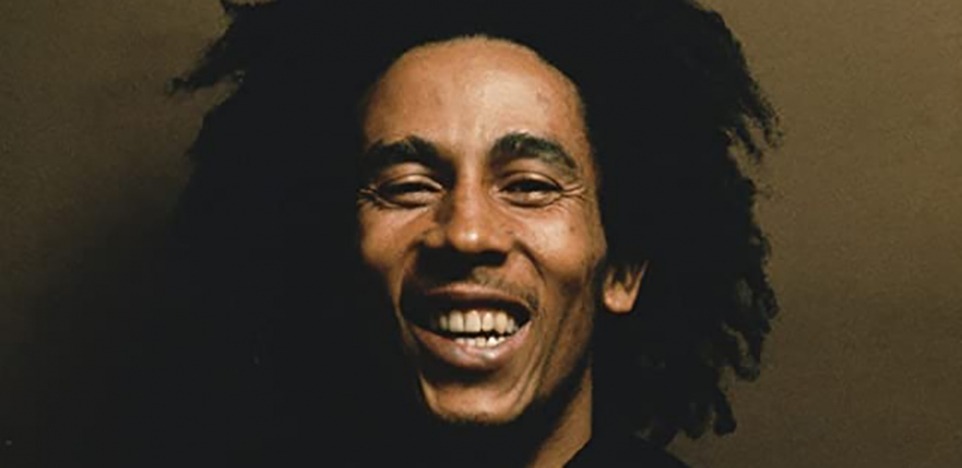Bob Marley began his life as a poor country boy in Jamaica on February 6, 1945, and died of cancer in Miami on May 8, 1981. In his brief 36-year lifetime he created reggae music and made it popular around the world. He espoused Rastafarian religion and became a prophet of a message of unity of all peoples. More than 20 million of his records have been sold, and one of them, Legend, continues to sell at a rate of 250,000 albums a year.
"Emancipate yourselves from mental slavery,
None but ourselves can free our mind."
— Bob Marley's "Redemption Song"
This extraordinary documentary on Marley's life and legacy is directed by Kevin Macdonald who was at the helm of the global crowd-sourced documentary Life in a Day. Thanks to this film's 144-minute running time, Macdonald is able to do justice to the complexity of Marley's career using concert and studio footage and a lively mix of commentaries by more than 60 of his family, friends, fellow musicians, producers, and others. Key insights into his musical contributions are offered by Neville "Bunny" Livingston of The Wailers, and Nevile Garrick, The Wailers' artistic director. We see how the singer/songwriter's music evolved over the years, and we also, thanks to the support of the Marley family, have unusual access to behind-the-scenes stories of his daily life. From the memories of his cousin who still lives in the village where Bob was born to his children's comments on their father's parenting style, we see the man behind the legend.
"Cause I remember when we used to sit
In a government yard in Trench Town
Observing the hypocrites
Mingle with the good people we meet."
— Bob Marley's "No Woman No Cry"
Marley's parents were a black teenage mother and an older white man who was not around to share his son's childhood and youth. The boy was bullied at school and hated by many of his peers for his mixed race heritage. Marley never got over being forced into the role of outsider.
In the late 1950s, he and his mother moved to Kingston and lived in Trench Town, a slum. Marley polished his singing talents and released his first single in 1962 titled "Judge Not." He joined with Bunny Livingston and Peter Tosh to form a group called The Wailing Wailers. One of the many little stories that are sprinkled throughout this film relates that the group used to practice by singing for the spirits in the cemetery so they wouldn't be afraid on stage. Their single "Simmer Down" shot to the top of the charts in 1964. Feeling good about his prospects, he married Rita Anderson in 1966. A song he wrote for her, "Stir It Up" became wildly popular as one of the earliest examples of reggae. In a fascinating section of the documentary, musicians discuss how this style of music with its rhythmic accents on the off-beat was discovered almost by accident in Jamaican studios.
In 1972, Marley and The Wailers signed a contract with Island Records in London and released their first album Catch a Fire. It was followed by Burnin which contained the song "I Shot the Sheriff." Rock superstar Eric Clapton made the ballad a smash hit in America with his version of it. A concert at the Lyceum in London in 1995 is called a "tipping point" in Marley's career as an international sensation.
"Be not selfish in your doings
Pass It On
Help your brothers in their needs,
Pass It On."
— Bob Marley's "Pass It On"
During the 1970s Marley got very interested in the Rastafarian movement which emphasized the teachings of black nationalist Marcus Garvey, the Old Testament, a strict code of behavior, African roots, and a heightened critique of Babylon (materialism). Marley the Rasta preacher wrote and sang reggae ballads about war, revolution, and poverty.
Jamaica during this period was the scene of often violent clashes between followers of different political parties. Marley, now a cult figure around the world, was shot and wounded in 1976, an action attributed to the political strife. Two years later he gave a free concert to 80,000 people in Kingston with the intention of bringing the two leaders of battling factions together.
Marley's album Exodus was heralded as a landmark for the artist with its thematic richness. Time spent in Africa, which Rastafarians regard as their true homeland, had a deepening effect on the reggae superstar. Marley and his band played in the official independence day ceremony in Zimbabwe in 1980 as a token of their high hopes for more freedom on the continent. Also in the same year, Marley and The Wailers hit the top of the charts again with Uprising, an inspiring and enlightening album.
"Why not help one another on
the way
Make it much easier
Say you just can't live that
negative way
You know what I mean'
Make way for the positive day"
— Bob Marley's "Positive Vibrations"
While on tour in the United States in 1980, Marley learned that he had cancer throughout his body. He sought treatment at a holistic center in Germany, but eventually was told that nothing more could be done for him and he decided to go back to Jamaica. He died during a layover in Miami. More than 30,000 people attended the state funeral in Jamaica.
Every time a reggae song is played, Bob Marley can take credit for ushering into the world this infectiously syncopated, laid-back music and its positive vibrations. The closing montage of the film is an inspiring portrait of how far his "one love" reaches to this day.
Special features on the DVD include "Around the World"; an extended interview with Neville "Bunny" Livingston of The Wailers; "Children's Memories": additional interviews with David "Ziggy" Marley, Stephen Marley, and Cedella Marley; Listening to "I'm Loose"; a photo gallery; and a commentary with director Kevin Macdonald and David "Ziggy" Marley.
